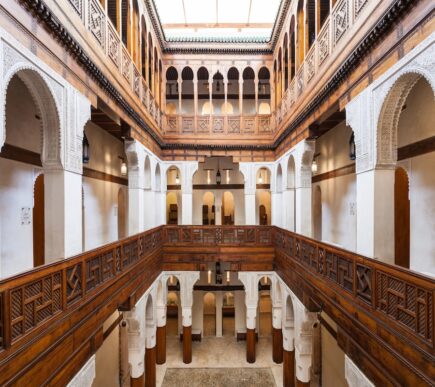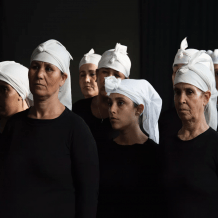
The Nejjarine Museum: Morocco’s Magnificent Monument to Woodcraft
In the labyrinthine depths of Fes el Bali’s ancient medina, near the aromatic Henna Souk, stands the Nejjarine Museum of Wooden Arts and Crafts – a masterpiece dedicated to Morocco’s rich heritage of wooden arts and crafts. This architectural gem, opened in 1998, tells the story of centuries of craftsmanship through both its structural elegance and its carefully curated collections.
A Foundouk Reborn
The Nejjarine Museum of Wooden Arts and Crafts occupies a meticulously restored 14th-century foundouk – a traditional merchant’s inn that once housed traveling traders and their precious wares. Like many foundouks of its era, the building follows a classical architectural pattern: a square structure built around a central courtyard, where a fountain provides both practical and aesthetic relief from Morocco’s intense heat.
The restoration of the Fes Nejjarine Museum of Wooden Arts and Crafts, supported by the Mohammed Karim Lamrani Foundation, has transformed this historic structure into one of Fes’s most stunning cultural spaces. Two levels of intricately carved wooden balconies overlook the courtyard, their railings and arches showcasing the pinnacle of Moroccan woodworking artistry. Each level tells its own story through architectural details that combine functional design with decorative sophistication.
A Treasury of Wooden Wonders
The Nejjarine Museum of Wooden Arts and Crafts collection spans centuries of Moroccan woodworking tradition. Visitors can explore rooms filled with masterfully crafted artifacts that demonstrate the evolution of this ancient craft:
- Elaborate prayer beads and intricate door locks that speak to the marriage of functionality and artistry
- Ancient musical instruments that still seem to hold the echoes of medieval Moroccan melodies
- Masterfully carved chests that once held the treasures of wealthy merchants
- An impressive collection of 18th and 19th-century woodworking tools, offering insights into historical crafting techniques
The museum showcases works created from Morocco’s native woods, including:
- Cedar from the Middle Atlas, prized for its durability and warm tones
- Rich mahogany and sturdy oak
- Aromatic thuya and robust acacia
From Commerce to Culture
The building’s history as a commercial hub and later a police station adds layers to its cultural significance. The ground floor still houses its former jail, while a massive set of merchant’s scales serves as a testament to its commercial heritage. Perhaps the most unexpected treasure lies in an unlikely place – the public bathrooms feature one of Fes’s finest cedar wood ceilings, demonstrating how Moroccan craftsmen elevated even mundane spaces to works of art.
Nejjarine Museum of Wooden Arts and Crafts: A Living Tradition
The museum’s location in Place el-Nejjarine (Carpenters’ Square) places it at the heart of a still-thriving woodworking tradition. The famous Nejjarine Fountain, adorned with intricate zellij tilework, marks the entrance to the Nejjarine Souk, where modern artisans continue their ancestors’ craft. Here, visitors can watch skilled craftspeople creating everything from decorative boxes to contemporary furniture, using techniques passed down through generations.
The rooftop terrace offers a perfect conclusion to any visit. Here, guests can enjoy traditional mint tea while taking in panoramic views of the medina’s timeless landscape. The perspective from above helps visitors appreciate how the museum fits into the broader tapestry of Fes’s architectural heritage.
A Legacy Preserved
The Nejjarine Museum represents more than just a collection of wooden artifacts – it’s a living testament to Morocco’s Islamic artistic heritage. This tradition continues to thrive in cities like Marrakech, Tetouan, Essaouira, Meknes, and Fes itself, where modern craftspeople maintain the high standards set by their predecessors.
For visitors to Fes, the Nejjarine Museum offers both cultural enrichment and peaceful respite from the medina’s bustling souks. It stands as a reminder that in Morocco, woodworking isn’t just a craft – it’s an art form that has helped shape the nation’s cultural identity for centuries.
For more information about Nejjarine Wooden Crafts and Art Museum on a Fes Private Tour





